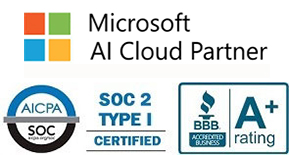
In today's fast-paced healthcare landscape, medical practices face numerous challenges in managing their IT infrastructure effectively. From ensuring data security to maintaining regulatory compliance, the healthcare demands of IT are greater than ever. However, the importance of IT in healthcare cannot be overstated—it underpins efficient and secure operations, enabling healthcare providers to deliver optimal patient care.
In this article, we'll explore how managed IT services can alleviate these challenges and streamline operations for medical practices, empowering them to focus on what matters most: patient care.
The Role of Managed IT Services in Medical Practices
In the dynamic environment of healthcare, managed IT services play a pivotal role in ensuring the seamless operation of medical practices. At its core, managed IT services involve the outsourcing of IT tasks and responsibilities to a specialized provider like ICSSNJ, which assumes the management and maintenance of a practice's IT infrastructure.
- 24/7 Monitoring: Managed IT services provide continuous monitoring of a practice's IT systems and networks to detect and address any potential issues proactively.
- Data Security: This includes implementing firewalls, encryption, access controls, and other security mechanisms to safeguard patient information against unauthorized access, breaches, and cyber threats.
- Compliance Management: Healthcare practices are subject to stringent regulatory requirements, such as HIPAA (Health Insurance Portability and Accountability Act), which govern the privacy and security of patient health information. Managed IT services ensure that medical practices remain compliant with these regulations by implementing and maintaining the necessary controls, policies, and procedures.
- Support Services: Managed IT services offer comprehensive technical support to address the diverse IT needs of medical practices. This includes troubleshooting technical issues, resolving system errors, and providing assistance to users encountering IT-related challenges. With dedicated support staff available, medical practices can rely on prompt and effective resolution of IT issues, minimizing disruptions to operations.
Key Benefits of Managed IT for Medical Practices
Managed IT provides numerous advantages for medical practices, addressing crucial aspects such as data security, operational efficiency, scalability, and cost management. Here's a detailed look at how managed IT services can positively impact medical practices:
Improved Data Security
Managed IT services prioritize safeguarding sensitive patient data and guarantee compliance with regulations such as HIPAA. By implementing robust security measures like encryption, access controls, and threat detection systems, managed IT providers help safeguard patient information from unauthorized access, breaches, and cyber threats.
Enhanced Operational Efficiency
Outsourcing IT tasks to managed service providers can streamline operations and enhance efficiency, allowing healthcare staff to focus on what they do best: providing excellent patient care. With managed IT services handling the day-to-day management and maintenance of IT systems, medical professionals can devote more time and attention to their patients, rather than dealing with technical issues and IT-related disruptions. This leads to smoother workflows, improved productivity, and ultimately, better patient outcomes.
Scalability
Managed IT services are designed to adapt to the evolving needs of medical practices, supporting growth and expansion with minimal disruption. Whether opening new locations, implementing new technologies, or scaling up existing infrastructure, managed IT providers offer flexible solutions that can seamlessly accommodate changes in practice size and complexity. By ensuring that IT resources align with business objectives, managed IT services enable medical practices to scale their operations efficiently and effectively.
Cost Management
Managed IT services provide predictable IT expenses, helping medical practices budget more effectively and plan for future growth. Instead of dealing with unpredictable repair costs or unexpected downtime, practices can benefit from fixed monthly or annual fees for IT services. This predictability allows for better financial planning and allocation of resources, minimizing the risk of budget overruns and ensuring that IT expenses remain manageable and sustainable in the long term.
Essential Features of Managed IT Service for Healthcare
In the healthcare sector, where data security and regulatory compliance are of utmost importance, the features of managed IT services are customized to meet the specific needs and challenges encountered by medical practices. Here are some of the essential features of a managed IT service for healthcare:
Compliance and Security Protocols
Managed IT services in the healthcare sector prioritize adherence to regulations like HIPAA (Health Insurance Portability and Accountability Act) to ensure the protection of patient data. Advanced security measures, including encryption, multi-factor authentication, and intrusion detection systems, are implemented to safeguard against unauthorized access, data breaches, and cyber threats.
Proactive Support and Maintenance
Round-the-clock IT support is a cornerstone of managed IT services for healthcare, offering proactive monitoring and maintenance to prevent issues before they escalate. Proactive maintenance activities, such as software updates, patches, and system optimizations, ensure that IT infrastructure remains secure, stable, and performant, allowing medical practices to focus on delivering quality patient care without worrying about technical issues.
Disaster Recovery and Backup
Data backup solutions, including onsite and offsite backups, cloud backups, and automated backup schedules, are implemented to create redundant copies of critical data and applications. In case of a disaster, like a cyberattack or natural calamity, or hardware failure, managed IT providers facilitate swift recovery by restoring data from backups and minimizing downtime.
Customized IT Solutions
Managed IT providers work closely with medical practices to assess their IT infrastructure, workflows, and objectives, designing customized solutions that align with their unique goals and challenges. Whether it's implementing electronic health record (EHR) systems, optimizing network performance, or integrating telemedicine solutions, managed IT services are tailored to enhance efficiency, productivity, and patient outcomes.
Choosing the Right Managed IT Provider
When selecting a managed IT provider, medical practices should prioritize expertise in healthcare IT, demonstrated through experience and familiarity with industry-specific challenges.
Expertise in Healthcare IT
Healthcare IT encompasses specific regulations, compliance requirements, and workflow considerations that differ from other sectors. Look for a provider with extensive experience working with medical practices, hospitals, and healthcare organizations. Their expertise in healthcare IT ensures that they understand the intricacies of the healthcare landscape and can tailor solutions to meet the needs of your practice effectively.
Case Studies and Testimonials
Look for providers that offer case studies, success stories, and testimonials from other medical practices they have served. These real-world examples demonstrate the provider's ability to deliver results, solve challenges, and meet the needs of similar healthcare organizations.
Assessment and Consultation Services:
Look for providers that conduct thorough assessments of your IT infrastructure, workflows, security posture, and compliance status. These assessments help identify areas for improvement, vulnerabilities, and opportunities for optimization.
Are You Ready to Streamline IT Operations for Your Medical Practice?
Managed IT services offer medical practices a powerful solution for enhancing efficiency, improving security, and ultimately delivering better patient care. By harnessing the advantages of managed IT, practices can concentrate on delivering high-quality patient care while alleviating the complexities of IT management to seasoned professionals.
By partnering with a trusted provider like ICSSNJ, medical practices can unlock the full potential of their IT infrastructure and position themselves for success in today's healthcare landscape.
To learn more about how managed IT services can transform your practice, contact ICSSNJ today for a consultation.
About Us:
- 150+ 5-Star Google Rated IT Firm
- Microsoft Certified Cloud AI Partner
- SOC II Certified Managed Service Provider
- Better Business Bureau A+ Rated






